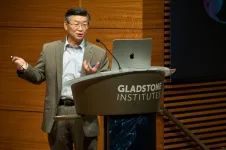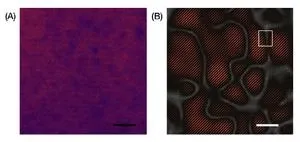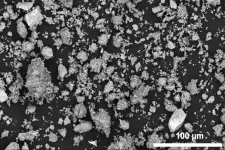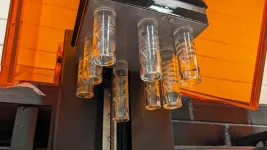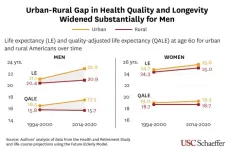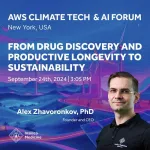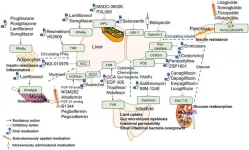(Press-News.org) Gladstone Institutes has established a new scientific award, the Sobrato Prize in Neuroscience, to advance breakthroughs in brain research with high potential for patient impact—and announced it will present the inaugural prize to Yadong Huang, MD, PhD, a trailblazer in Alzheimer’s research.
In his nearly three decades at Gladstone, Huang has led a series of pioneering studies on the genetic underpinnings of Alzheimer’s disease, with discoveries that have opened multiple new avenues for drug development. He also founded and leads Gladstone’s Center for Translational Advancement, aimed at bringing treatments for unsolved diseases to patients more rapidly and affordably.
“Dr. Huang is a world-renowned expert on Alzheimer’s disease, and particularly on the role of the APOE4 gene in neurodegeneration and cognitive decline,” says Lennart Mucke, MD, director of the Gladstone Institute of Neurological Disease. “With an unwavering focus on patient impact, and numerous breakthroughs that are shaping future treatment approaches, his achievements are fully aligned with the mission of the Sobrato Prize.”
The prize, to be given annually to a Gladstone scientist, is made possible through a generous gift from Resonance Philanthropies, a donor-advised fund of Silicon Valley Community Foundation, funded by Sheri Sobrato. Honorees will receive $250,000 to advance brain disease-focused research with high translational impact.
“Neuroscience research is among the most exciting and promising areas we’re funding today,” says Sobrato, a donor and impact investor with a focus on improving healthcare. “I’m confident that Gladstone’s team of outstanding researchers will leverage the new Sobrato Prize in Neuroscience to bring promising discoveries to patients and their families.”
A secondary goal of the prize is to serve as a catalyst for raising greater awareness of—and funding for—Gladstone’s efforts to overcome disease with science, Sobrato says.
Bringing Breakthroughs to the Patient
Huang joined Gladstone in 1995, starting as a postdoctoral researcher in the lab of Robert Mahley, MD, PhD, president emeritus and founder of Gladstone Institutes. Over the years, the two became close collaborators, and both have dedicated their careers to understanding the cellular and molecular mechanisms of APOE4 in the brain.
Besides aging, APOE4 is the most impactful risk factor for Alzheimer’s disease—the most common neurodegenerative disorder and form of dementia in older adults. More than half of Alzheimer’s patients carry the APOE4 gene variant, making it the most significant genetic risk factor.
“Yadong is attacking this problem with multiple scientific approaches, from animal models to working with induced pluripotent stem cells (iPSCs) derived from Alzheimer’s patients with the APOE4 variant,” Mahley says. “Recently, he has advanced his efforts into clinical investigations, including a drug trial. Yadong has a very strong basic science approach but never loses sight of the translational aspect of his work.”
Notably, Huang was the first to conclusively show that, in response to injury or stress, neurons first produce but then abnormally process APOE4, resulting in toxic fragments that contribute to Alzheimer’s. He also investigated a rare mutation of the APOE gene known as the Christchurch variant, which protects against Alzheimer’s.
Most importantly in regard to the Sobrato Prize in Neuroscience, Huang is studying approaches for blocking the detrimental effects of APOE4, including the development of a type of medicine called a protease inhibitor to prevent the production of toxic APOE4 fragments. He is also testing a drug called bumetanide, which is already FDA approved for other disease indications, in a clinical trial for Alzheimer’s disease.
A Prize to Propel Science
“The Sobrato Prize will make an enormous impact on moving important Alzheimer’s research closer to the finish line to benefit patients,” Huang says. “I’m honored to be named the first recipient of this award, and I thank Sheri Sobrato for her dedication to advancing critical science that can ultimately overcome disease.”
Philanthropy plays an integral role in empowering researchers to pursue high-risk, high-gain initiatives with potentially transformative translational potential, says Gladstone President Deepak Srivastava, MD.
“Our researchers often make important discoveries that we want to pursue immediately, not in two or three years,” Srivastava says. “This is where philanthropic support, such as Sheri Sobrato’s gift, makes a world of difference. It allows us to advance discoveries through the development pipeline to a point where we can attract additional funding from conventional agencies such as the National Institutes of Health or engage with a pharma partner to move them toward the clinic.”
About Gladstone Institutes
Gladstone Institutes is an independent, nonprofit life science research organization that uses visionary science and technology to overcome disease. Established in 1979, it is located in the epicenter of biomedical and technological innovation, in the Mission Bay neighborhood of San Francisco. Gladstone has created a research model that disrupts how science is done, funds big ideas, and attracts the brightest minds.
END
Gladstone presents inaugural Sobrato prize in neuroscience to Yadong Huang, a pioneer of Alzheimer’s research
The prize will be awarded annually to a Gladstone scientist who has made breakthrough discoveries in brain research; funds will help advance scientific discoveries from the lab to the clinic.
2024-09-25
ELSE PRESS RELEASES FROM THIS DATE:
Manganese cathodes could boost lithium-ion batteries
2024-09-25
Rechargeable lithium-ion batteries are growing in adoption, used in devices like smartphones and laptops, electric vehicles, and energy storage systems. But supplies of nickel and cobalt commonly used in the cathodes of these batteries are limited. New research led by the Department of Energy’s Lawrence Berkeley National Laboratory (Berkeley Lab) opens up a potential low-cost, safe alternative in manganese, the fifth most abundant metal in the Earth’s crust.
Researchers showed that manganese can be effectively used in emerging cathode materials called disordered rock salts, or DRX. Previous research suggested that to perform well, DRX materials had to be ground down to nanosized ...
To make fluid flow in one direction down a pipe, it helps to be a shark
2024-09-25
Link to Google Drive folder containing images:
https://drive.google.com/drive/folders/1ZTBXkIFqwl_OyIMrUA1se_iv7hqEm_52?usp=sharing
Link to release:
https://www.washington.edu/news/2024/09/25/tesla-coil-shark-intestines/
FROM: James Urton
University of Washington
206-543-2580
jurton@uw.edu
(Note: researcher contact information at the end)
For immediate release
Sept. 25, 2024
To make fluid flow in one direction down a pipe, it helps to be a shark
Flaps perform essential jobs. From pumping hearts to revving engines, flaps help fluid flow in one direction. ...
Growing divide: Rural men are living shorter, less healthy lives than their urban counterparts
2024-09-25
Rural men are dying earlier than their urban counterparts, and they’re spending fewer of their later years in good health, according to new research from the USC Schaeffer Center for Health Policy & Economics.
Higher rates of smoking, obesity and cardiovascular conditions among rural men are helping fuel a rural-urban divide in illness, and this gap has grown over time, according to the study published this week in the Journal of Rural Health. The findings suggest that by the time rural men reach age 60, there are limited opportunities to fully address this disparity, and earlier interventions may be needed to prevent it from widening ...
During NY Climate Week, Alex Zhavoronkov PhD, Founder and CEO of Insilico Medicine, talks about Gen AI applications in drug discovery, longevity and climate change solutions at AWS Climate Tech & AI F
2024-09-25
Held annually, NY Climate Week is a pivotal event in the global climate change calendar. Bringing together notable leaders, celebrities, climate professionals, and innovators from around the world, the event serves as a critical platform for discussing and advancing climate action. This year’s theme, "It’s Time," underscores the urgency for immediate and ambitious efforts to tackle climate change, and the process could be accelerated with Generative AI and other cutting-edge technologies.
Insilico Medicine ...
First genome-wide comparison of vapers and smokers finds similar DNA changes linked to disease risk
2024-09-25
Young adults who vape show chemical changes in their DNA similar to those found in young adults who smoke — changes known to be linked to the development of cancer — according to a new study just published in the American Journal of Respiratory Cell and Molecular Biology.
A team of researchers from the Keck School of Medicine of USC measured DNA methylation, a chemical modification of DNA that can effectively turn genes “on” or “off, in the oral cells of young adult vapers, smokers and non-users. DNA methylation is vital to normal cellular ...
International research challenge to tackle knowledge gaps in women’s cardiovascular health
2024-09-25
DALLAS, Sept. 25, 2024 — The American Heart Association, celebrating 100 years of lifesaving service as the world’s leading nonprofit organization focused on heart and brain health for all, is joining with other top cardiovascular research funders around the world to support an international scientific research grant focused on women’s cardiovascular health. Scientific researchers around the world are invited to apply for the award to foster global advancements in understanding and improving the diagnosis, treatment and prevention of cardiovascular disease (CVD) among women.
A 2022 presidential advisory ...
Pipeline of new drug treatment for non-alcoholic fatty liver disease/metabolic dysfunction-associated steatotic liver disease
2024-09-25
Non-alcoholic fatty liver disease (NAFLD), recently reclassified as metabolic dysfunction-associated steatotic liver disease (MASLD), has become the most prevalent chronic liver disease globally. This reclassification underscores the metabolic dysfunction central to the disease, which spans a spectrum from simple steatosis to more severe forms like steatohepatitis, fibrosis, and cirrhosis. Given the significant overlap between MASLD and type 2 diabetes mellitus (T2DM), the therapeutic strategies for MASLD have increasingly focused on addressing metabolic derangements. Despite its global prevalence, no specific drugs have been approved for MASLD, highlighting an urgent need ...
Kissick Family Foundation, Milken Institute announce $3 million in funding for frontotemporal dementia research
2024-09-25
September 25, 2024 (Washington, DC)—The Kissick Family Foundation Frontotemporal Dementia (FTD) Grant Program, in partnership with the Milken Institute Science Philanthropy Accelerator for Research and Collaboration (SPARC), today announced six research teams awarded two-year grants to advance scientific understanding of FTD, totaling $3 million in new funding for this disease.
This inaugural cycle of the Kissick Family Foundation FTD Grant Program represents a unique philanthropic strategy that specifically targets basic or early-stage translational research projects that focus on those disease cases ...
How does cancer spread? Follow the map
2024-09-25
Metastatic cancer can be a devastating diagnosis. The cancer is spreading. It may travel to multiple organs in the body. This could mean more pain and ultimately, death.
Unfortunately, just how cancer spreads remains unclear. But now, Cold Spring Harbor Laboratory (CSHL) Professor Adam Siepel and colleagues have a way to better understand that process. New technology developed at Weill Cornell Medicine barcodes cells to track the highways by which prostate cancer spreads throughout the body.
The resulting roadmap shows that most cancer cells actually stay put within the tumor. However, ...
Shrinking AR displays into eyeglasses to expand their use
2024-09-25
Augmented reality (AR) takes digital images and superimposes them onto real-world views. But AR is more than a new way to play video games; it could transform surgery and self-driving cars. To make the technology easier to integrate into common personal devices, researchers report in ACS Photonics how to combine two optical technologies into a single, high-resolution AR display. In an eyeglasses prototype, the researchers enhanced image quality with a computer algorithm that removed distortions.
AR systems, like those in bulky goggles and automobile head-up displays, require portable optical components. But shrinking the typical four-lens AR system to the size of eyeglasses or smaller ...
LAST 30 PRESS RELEASES:
Power in motion: transforming energy harvesting with gyroscopes
Ketamine high NOT related to treatment success for people with alcohol problems, study finds
1 in 6 Medicare beneficiaries depend on telehealth for key medical care
Maps can encourage home radon testing in the right settings
Exploring the link between hearing loss and cognitive decline
Machine learning tool can predict serious transplant complications months earlier
Prevalence of over-the-counter and prescription medication use in the US
US child mental health care need, unmet needs, and difficulty accessing services
Incidental rotator cuff abnormalities on magnetic resonance imaging
Sensing local fibers in pancreatic tumors, cancer cells ‘choose’ to either grow or tolerate treatment
Barriers to mental health care leave many children behind, new data cautions
Cancer and inflammation: immunologic interplay, translational advances, and clinical strategies
Bioactive polyphenolic compounds and in vitro anti-degenerative property-based pharmacological propensities of some promising germplasms of Amaranthus hypochondriacus L.
AI-powered companionship: PolyU interfaculty scholar harnesses music and empathetic speech in robots to combat loneliness
Antarctica sits above Earth’s strongest “gravity hole.” Now we know how it got that way
Haircare products made with botanicals protects strands, adds shine
Enhanced pulmonary nodule detection and classification using artificial intelligence on LIDC-IDRI data
Using NBA, study finds that pay differences among top performers can erode cooperation
Korea University, Stanford University, and IESGA launch Water Sustainability Index to combat ESG greenwashing
Molecular glue discovery: large scale instead of lucky strike
Insulin resistance predictor highlights cancer connection
Explaining next-generation solar cells
Slippery ions create a smoother path to blue energy
Magnetic resonance imaging opens the door to better treatments for underdiagnosed atypical Parkinsonisms
National poll finds gaps in community preparedness for teen cardiac emergencies
One strategy to block both drug-resistant bacteria and influenza: new broad-spectrum infection prevention approach validated
Survey: 3 in 4 skip physical therapy homework, stunting progress
College students who spend hours on social media are more likely to be lonely – national US study
Evidence behind intermittent fasting for weight loss fails to match hype
How AI tools like DeepSeek are transforming emotional and mental health care of Chinese youth
[Press-News.org] Gladstone presents inaugural Sobrato prize in neuroscience to Yadong Huang, a pioneer of Alzheimer’s researchThe prize will be awarded annually to a Gladstone scientist who has made breakthrough discoveries in brain research; funds will help advance scientific discoveries from the lab to the clinic.
